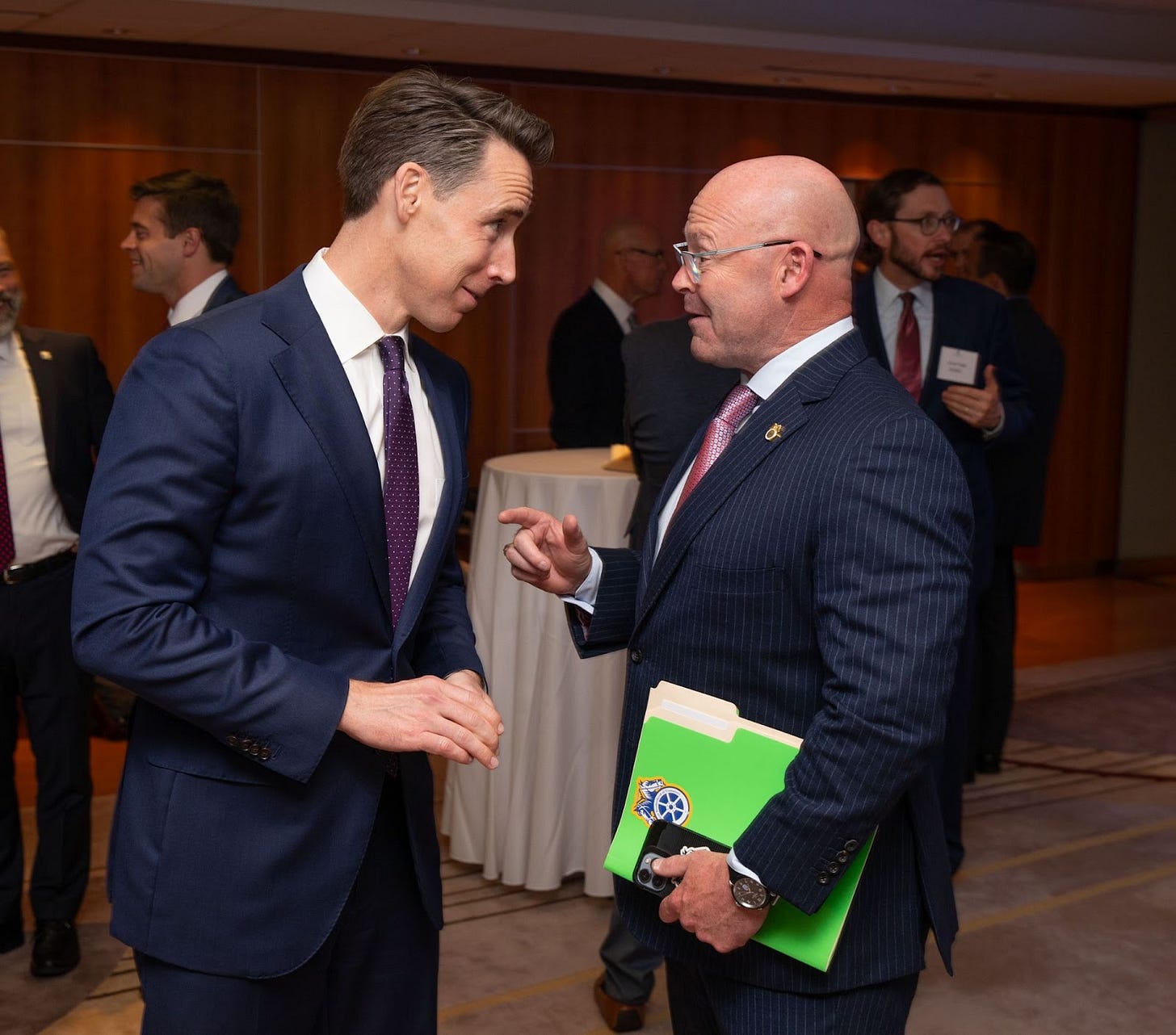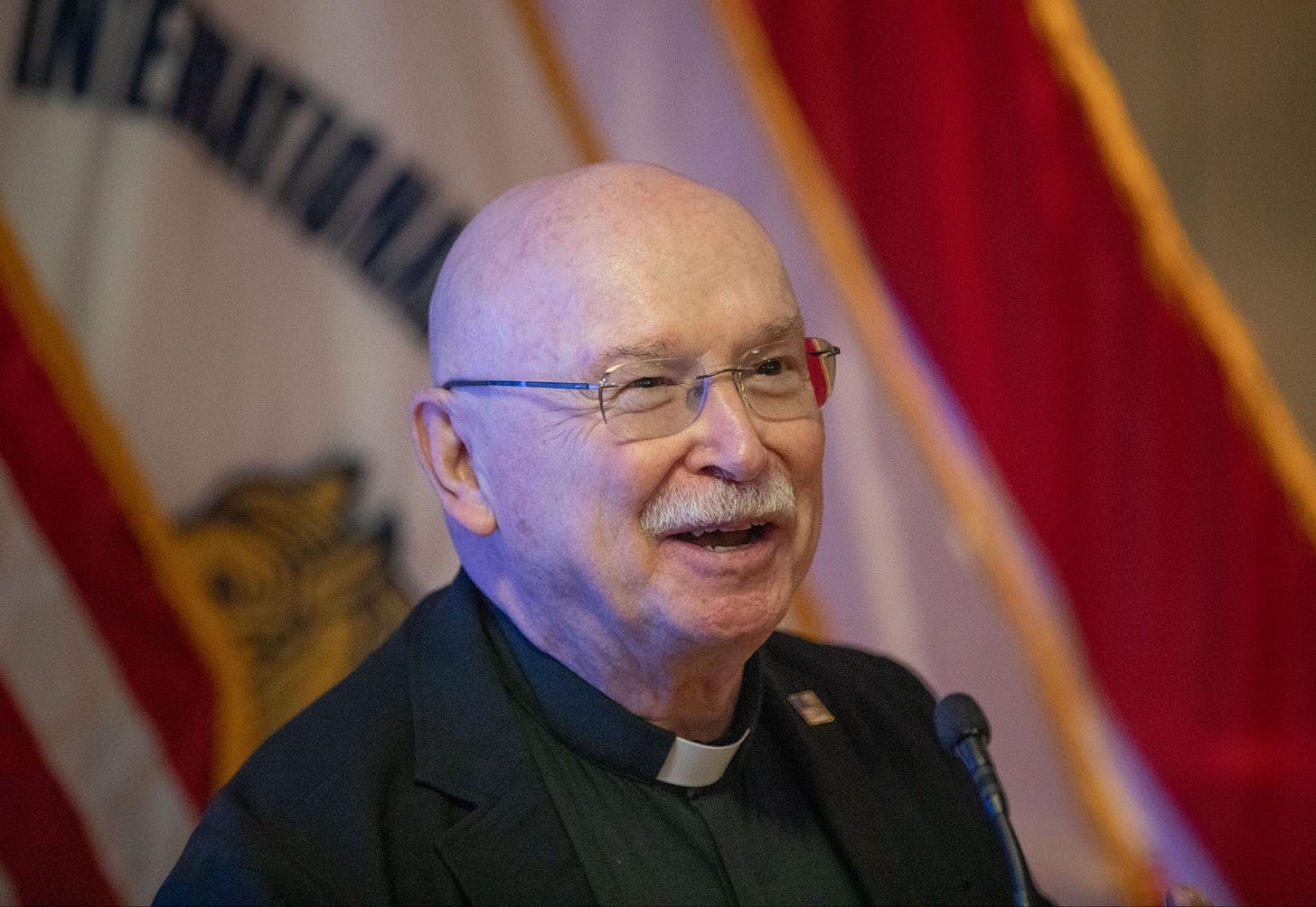Why Is Organized Labor So Catholic?
The Teamsters, Rerum Novarum, and the fight for workers on the Right.
A copy of Rerum Novarum published by the International Brotherhood of Teamsters (photo credit: The International Brotherhood of Teamsters)
The American worker stands at a crossroads. Artificial intelligence and automation more broadly threaten the work, livelihoods, and dignity of working people across professions, as corporate leaders are constantly celebrating. Amid the uncertainty, one of the largest labor unions in the country, the International Brotherhood of Teamsters, held an event to discuss these changes alongside what may seem like an odd cosponsor: the Catholic Church.
The worker stands at a political crossroads, too: organized labor is shifting Right, more young people are becoming Catholic, and the Republican Party is realigning itself away from the old guard’s free trade, pro-business model. All of these shifts were apparent as I stood in the penthouse of the Teamsters’ D.C. headquarters surrounded by young staffers and conservative members of Congress. I and the other attendees also held copies of the labor-related 1891 Catholic encyclical Rerum Novarum, complete with a Teamsters’ logo on the cover.
As a cradle Catholic from New England raised in a family of Kennedy Democrats, it was all a bit confusing. Weren’t there some fraught relationships here? Why were the Teamsters holding an event about Catholic social teaching?
The event was a celebration of Rerum Novarum’s legacy amid “renewed interest” in the document and the wider Catholic commitment to workers, particularly as technology-driven threats to workers rise. Teamsters general president Sean M. O’Brien was there to deliver remarks, flanked by union members, elected officials, and perhaps 100 D.C. staffers from the Trump administration, Capitol Hill, think tanks, advocacy organizations, and beyond. A local Catholic priest introduced O’Brien.
Senator Josh Hawley (left) and Teamsters general president Sean M. O’Brien (right) (photo credit: The International Brotherhood of Teamsters)
To understand the significance of the occasion, one needs to understand the significance of Rerum Novarum. Published in the wake of the industrial revolution, Pope Leo XIII’s encyclical explains the need to protect the dignity of the working class, both from exploitative labor conditions and the specter of socialism.
While the industrial revolution brought wonders of technical advancement, it also hollowed out economies across Europe and upended the lives of working people. As Pope Leo wrote:
That some opportune remedy must be found quickly for the misery and wretchedness pressing so unjustly on the majority of the working class... Hence, by degrees it has come to pass that working men have been surrendered, isolated and helpless, to the hardheartedness of employers and the greed of unchecked competition…
But socialism, then gathering steam across Europe as a radical response to the rise of industry, was no better—and perhaps even worse. “To remedy these wrongs the socialists, working on the poor man’s envy of the rich, are striving to do away with private property, and contend that individual possessions should become the common property of all,” Pope Leo wrote. But this envy was corrosive. The socialists, he contended, were “emphatically unjust, for they would rob the lawful possessor, distort the functions of the State, and create utter confusion in the community.”
Where real solutions are concerned, the encyclical’s tie to organized labor is explicit:
Most important of all are workingmen’s unions, for these virtually include all the rest. History attests what excellent results were brought about by the artificers’ guilds of olden times. They were the means of affording not only many advantages to the workmen, but in no small degree of promoting the advancement of art, as numerous monuments remain to bear witness. Such unions should be suited to the requirements of this our age - an age of wider education, of different habits, and of far more numerous requirements in daily life. It is gratifying to know that there are actually in existence not a few associations of this nature, consisting either of workmen alone, or of workmen and employers together, but it were greatly to be desired that they should become more numerous and more efficient.
Rerum Novarum is a foundational text in Catholic social teaching. As Dr. Joseph Capizzi, Dean of Catholic University’s School of Theology and Religious Studies, explained in his opening remarks, this text is so significant in Church teaching that on many anniversaries of its writing, the Pope has issued a new encyclical celebrating the “singular event” of its publication.
Father Ray Fecteau delivers an invocation (photo credit: The International Brotherhood of Teamsters)
Pope John Paul II issued the last Rerum Novarum anniversary encyclical in 1991, but Vatican watchers believe the newly elected Pope Leo XIV may build on that commitment to workers during his tenure.
After taking the name of Rerum Novarum’s author, Pope Leo XIV announced in his first public appearance that, “in our own day, the church offers to everyone the treasury of her social teaching in response to another industrial revolution and to developments in the field of artificial intelligence that pose new challenges for the defense of human dignity, justice, and labor.” This threat—one the Teamsters raise the alarm on often—was precisely the focus of the event.
Few secular groups confront the challenges automation presents to workers more doggedly than organized labor, particularly those unions most driven by the stated interests of their members. To the Teamsters, unregulated AI means “no state oversight of driverless trucks, AI surveillance, or job-killing automation.” They’ve warned AI is “a power grab by Big Tech—and a direct threat to workers and states’ rights.” At the state and local level, the union has pushed back hard in defense of workers.
As the encyclical illustrates, the connection between labor and Catholics is an old one. Starting in the late 1800s , American Catholic leaders went to bat for organized labor, interceding on behalf of Irish immigrants and other laborers. Following the Great Depression, the Catholic worker’s movement had Church leaders manning the picket lines alongside laborers. The cultural ties of a largely working-class congregation, particularly in the Northeast, further cemented the marriage.
Event attendees reading Rerum Novarum (photo credit: The International Brotherhood of Teamsters)
That context helps explain not just the Teamsters event, but the growing interest among today’s conservatives, newly directed toward the “forgotten men and women” of America. Who else beyond these groups is so focused on the challenges confronting workers today? While the words may differ, the sentiment about adjusting to technological change is shared.
In O’Brien’s opening remarks, he reminded us that “humans are not resources, we are not instruments meant to be ground down and discarded,” just as Pope Leo XIII called on “the wealthy owner and the employer: not to look upon their work people as their bondsmen, but to respect in every man his dignity as a person ennobled by Christian character.” The preamble of the Teamsters constitution calls for confronting “the challenges of a global economy dominated by multi-national corporations that sweep past national borders and forage the globe in search of new workers and resources to exploit,” an echo of Rerum Novarum’s warning that “to defraud any one of wages that are his due is a great crime which cries to the avenging anger of Heaven.” Senator Josh Hawley’s newly introduced Faster First Contracts Act—which the Teamsters endorsed—calls for workers to see the fruits of their “legal—and moral—right to bargain collectively.” This too echoes Pope Leo’s condemnation of those who “are defrauding man of what his own labor has produced.”
Conservatives, while increasingly supportive of organized labor, often allow certain groups to poison the mental well. When they hear “labor union,” they don’t envision the truck drivers who power our economy or the Amazon warehouse workers organizing to fight against their corporate overlords. They instead think of people like Randi Weingarten, president of the American Federation of Teachers. Rather than seeing her duty as pursuing the common good, something O’Brien made clear motivates his actions in his remarks, Weingarten pushed to shut down schools during COVID, setting back a generation of children. She’s used her platform since to weigh in on seemingly every issue but America’s failing schools: the war in Ukraine; the deportation of illegal immigrants; and even the suggestion that President Trump and the Republican Party are Nazis.
Or, conservatives think of the leadership of the United Auto Workers (UAW), equally notable for using the union’s platform to advocate for the personal political beliefs of its leadership, topics that have nothing to do with its members—like on the war in Gaza. Polling from American Compass has found that both current and potential union members prefer that unions stick to workplace issues, not national politics, by a nearly 2-to-1 margin.
When it comes to organized labor, conservatives should instead think of groups like the Teamsters: rooted in the same concern for ordinary Americans that Republicans are waking up to; recognizing the need for business and capital to drive our economy collaboratively; focused on navigating technological and other changes in a way that protects something far greater than data or profit.
As AI seeps evermore into American daily life, battles over its use and regulation aren’t going away any time soon. But neither are the Teamsters.
“Rerum Novarum laid the foundation for collaboration between the Church and organized labor that continues to this day,” O’Brien told me after the event. “Together, we are protecting workers’ rights, combating exploitation, and ensuring that workers are safeguarded against the dangers posed by AI and automation. Our shared mission makes us a powerful force for preserving the dignity of work and improving the lives of working people.”







Organized private sector labor needs to cut its ties to public sector unions. The power is enticing but it comes with the loss of their souls and their ultimate destruction.
I’ll wait for the Republican controlled Senate, House and White House to quickly pass the First Contract Act before I believe anything else in this piece.